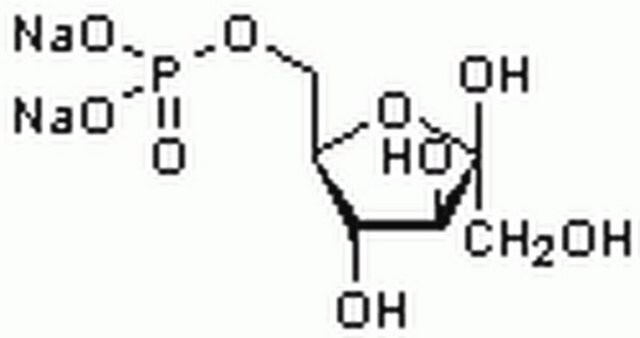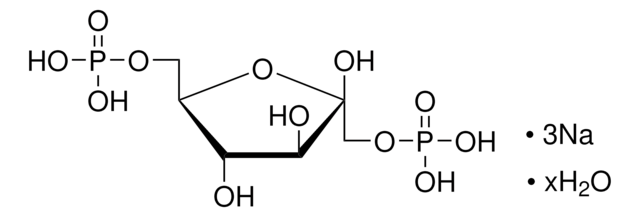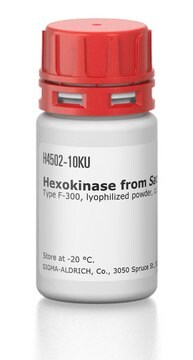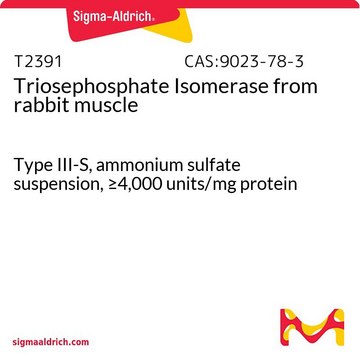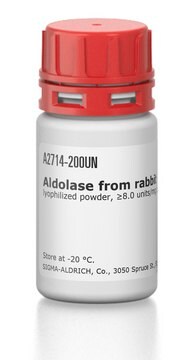F0137
Fructose-6-phosphate Kinase from Bacillus stearothermophilus
Type VII, lyophilized powder, ≥50 units/mg protein
Sinônimo(s):
6-Phosphofructokinase, ATP:D-fructose 6-phosphate 1-phosphotransferase
Faça loginpara ver os preços organizacionais e de contrato
About This Item
Produtos recomendados
tipo
Type VII
Nível de qualidade
Formulário
lyophilized powder
atividade específica
≥50 units/mg protein
peso molecular
34 kDa
Condições de expedição
wet ice
temperatura de armazenamento
−20°C
Descrição geral
Fructose-6-phosphate kinase from Bacillus stearothermophilus, a 34 kDa enzyme, belongs to phosphofructokinase (PFK) - like superfamily. The glutamate 161 and arginine 162 residues at the active site are crucial for substrate binding.
Research Area: Cell Signaling
Bacillus stearothermophilus phosphofructokinase (BsPFK) is a homotetramer that is allosterically inhibited by phosphoenolpyruvate (PEP), which binds along one dimer-dimer interface.
Bacillus stearothermophilus phosphofructokinase (BsPFK) is a homotetramer that is allosterically inhibited by phosphoenolpyruvate (PEP), which binds along one dimer-dimer interface.
Aplicação
Fructose-6-phosphate Kinase from Bacillus stearothermophilus was shown to interact with neuronal nitric oxide synthase (nNOS) causing a defect in glycolytic metabolism and increased fatigability in dystrophic muscle.
Fructose-6-phosphate Kinase from Bacillus stearothermophilus has been used in the assay mixture for mass spectrometry assay for phosphoglucoisomerase (PGI) (G6P to F6P reaction).
Fructose-6-phosphate kinase from Bacillus stearothermophilus has been used:
- in steady state analysis of phosphofructokinase activity in the presence of ATP deuterated at the C8 position(C8-D ATP)
- for standard curve generation for quantifying muscle phosphofructokinase (PFK) activity
Ações bioquímicas/fisiológicas
Fructose-1,6-bisphosphatase (FBP) is an important enzyme in glucose metabolism. It catalyzes the hydrolysis of fructose-1,6-bisphosphate to fructose-6-phosphate and inorganic phosphate. Fructose-6-phosphate kinase converts fructose-6-phosphate into fructose 1,6-bisphophate in the rate limiting step of the glycolysis cycle.
Phosphofructokinase (PFK) is an essential bifunctional enzyme that serves as a critical regulator in the intermediate stages of glycolysis. PFK is strongly linked to caveolae and is brought to caveolae by caveolin-1 in vascular smooth muscle cells (VSMCs).
Definição da unidade
One unit will convert 1.0 μmole of fructose 6-phosphate and ATP to fructose 1,6-diphosphate and ADP per minute at pH 9.0 at 30 °C.
forma física
Lyophilized powder containing buffer salt (e.g. phosphate buffer, or Tris buffer with NaCl)
Código de classe de armazenamento
11 - Combustible Solids
Classe de risco de água (WGK)
WGK 3
Ponto de fulgor (°F)
Not applicable
Ponto de fulgor (°C)
Not applicable
Equipamento de proteção individual
Eyeshields, Gloves, type N95 (US)
Escolha uma das versões mais recentes:
Já possui este produto?
Encontre a documentação dos produtos que você adquiriu recentemente na biblioteca de documentos.
Os clientes também visualizaram
Loss of positive allosteric interactions between neuronal nitric oxide synthase and phosphofructokinase contributes to defects in glycolysis and increased fatigability in muscular dystrophy
Wehling-Henricks M, et al.
Human Molecular Genetics, 18(18), 3439-3451 (2009)
Rockann Mosser et al.
Biochemistry, 52(32), 5421-5429 (2013-07-19)
Bacillus stearothermophilus phosphofructokinase (BsPFK) is a homotetramer that is allosterically inhibited by phosphoenolpyruvate (PEP), which binds along one dimer-dimer interface. The substrate, fructose 6-phosphate (Fru-6-P), binds along the other dimer-dimer interface. Evans et al. observed that the structure with inhibitor
Analysis of the phosphofructokinase subunits and isoenzymes in human tissues
G.A. Dunaway et al.
The Biochemical Journal, 251, 755-757 (1988)
Chunsheng Liu et al.
American journal of physiology. Gastrointestinal and liver physiology, 307(7), G749-G759 (2014-08-30)
Platelet-derived growth factor (PDGF) and transforming growth factor-β (TGF-β) signaling are required for hepatic stellate cell (HSC) activation under pathological conditions such as liver metastatic tumor growth. These two signaling pathways are functionally divergent; PDGF signaling promotes proliferation and migration
M Hattori et al.
Nature, 405(6784), 311-319 (2000-06-01)
Chromosome 21 is the smallest human autosome. An extra copy of chromosome 21 causes Down syndrome, the most frequent genetic cause of significant mental retardation, which affects up to 1 in 700 live births. Several anonymous loci for monogenic disorders
Nossa equipe de cientistas tem experiência em todas as áreas de pesquisa, incluindo Life Sciences, ciência de materiais, síntese química, cromatografia, química analítica e muitas outras.
Entre em contato com a assistência técnica
